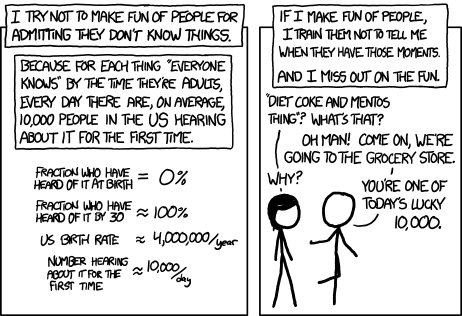Paul Erdős was a prolific Hungarian mathematician who spent much of the later part of his career traveling to visit collaborators around the world. According to his Wikipedia biography,
Erdős published around 1,500 mathematical papers during his lifetime, a figure that remains unsurpassed. He firmly believed mathematics to be a social activity, living an itinerant lifestyle with the sole purpose of writing mathematical papers with other mathematicians. Erdős’s prolific output with co-authors prompted the creation of the Erdős number, the number of steps in the shortest path between a mathematician and Erdős in terms of co-authorships.
Or, to quote from Stephen Heard’s recent post on Erdős:
Paul Erdős (1913-1996) was a Hungarian mathematician who published somewhere around 1,500 papers (in mostly pure-math fields including set theory and number theory) and had somewhere around 500 coauthors. He was a fascinating figure, and his biography The Man Who Loved Only Numbers is a great read. He was famous both for brilliance and for broad collaboration. Those two things in combination inspired mathematicians to invent the Erdős number as a metric of their collaborative closeness to Erdős. Here’s how it works: Erdős’s own Erdős number is E = 0; those who have coauthored research papers with Erdős have E = 1; those who have coauthored with an E = 1 scientist have, as a result, E=2, and so on.
Stephen’s Erdős number is a very impressive 3. And, since I’ve coauthored a paper with Stephen, that means mine is 4, which I think it pretty neat. (That’s the same as Stephen Hawking’s!)
Right after reading Stephen’s post (or, more accurately, Jeremy’s link to Stephen’s post), I visited the University of Florida to give a seminar, hosted by Bob Holt. When I got my schedule ahead of time from Bob, it included a couple of people who are not at the University of Florida, but who are/were there visiting Bob. That was sort of surprising, but not very, as Bob is someone who has collaborated with lots of people – as just one indicator, I remember as a grad student hearing that Bob Holt and Andy Dobson were the two people who were involved in by far the most NCEAS working groups. Given the breadth of topics Bob has worked on, as well as the strength of his contributions, it’s not surprising that lots of people visit him to work on things.
This combination of events got me wondering: is there anyone in ecology who compares to Erdős in terms of being prolific and exceptionally well-connected (in terms of collaborations)?
I think Bob Holt is a great candidate. According to Google Scholar, he has 446 papers. By my count, he has had 574 different coauthors! (You can check the list I assembled here.) Should we have the Holt number in ecology*, or can you come up with someone who is even more connected to other ecologists?
*Clearly this could be expanded to a Holt-Erdős number, a Holt-Erdős-Bacon number, etc. Thanks to Hao Ye, I know that Bob Holt has an Erdős number of 4, so my Holt-Erdős number is 6. (Updated to fix error — I originally said 8, but my Holt number is 2, so I don’t know why I wrote 8!)




